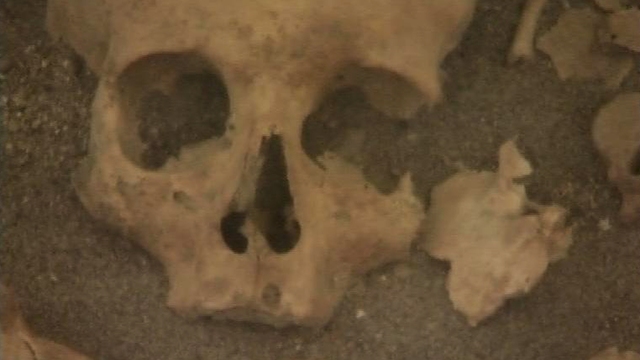Genocide Denied
We bring you the controversial story of the 20th Century's first genocide.
 In 1915, an estimated 1.5 million Armenians were slaughtered at the hands of the Ottoman Turks. Tortured, murdered, denied, forgotten, the terrible plight of the Armenians has never been properly publicised. Now, for the first time, they have been given a voice.
In 1915, an estimated 1.5 million Armenians were slaughtered at the hands of the Ottoman Turks. Tortured, murdered, denied, forgotten, the terrible plight of the Armenians has never been properly publicised. Now, for the first time, they have been given a voice.
In the desert of northern Syria, local Arab Bedouin scrape away at the rocks. Within a few seconds, a large, white object is revealed. It's a human skull - a chilling reminder of the shocking events that took place here nearly 90 years ago. Fearing a nationalist uprising by Christian Armenians, the Turks expelled the population from their homelands in Eastern Turkey. They were marched to death camps in the Syrian desert, where they were brutally slaughtered in their thousands.
Nori Latif, an Armenian still living in Syria, is the son of one of the few survivors of the massacre. He relates the scene his father witnessed all those years ago, when he was brought with 5000 other Armenians to the death camp at Magaday: "They lined them up, three or four deep, and shoot once, so they saved bullets. Some women were disembowelled with bayonets."
Yet, despite such tales from the lucky survivors of the massacre, as well as the incontrovertible evidence of the bones that litter the landscape, Turkey continues to deny the genocide. The government has even set up the Armenian Research Institute to manage the denial. Its spokesperson, Arslan Terzioglu, gives a range of excuses for the deaths: "They died due to contagious diseases like typhus and as a result of attacks by Kurdish and Bedouin bandits. This is in fact what happened. It is impossible to represent this as deliberate and as genocide."
Armenian survivors would however beg to differ. Now well into their nineties, they remember with horror the events of that fateful day in 1915. "They went and got 15 young boys by force. They brought skewers and poked them into their eyes. They did that to all of them, one by one," recalls one woman, who was only five at the time, her eyes welling up with tears at the memory. Another survivor describes how 3000 Armenians were rounded up, taken into the Deir el-Zour desert, doused with petrol and set alight.
But the government refuses to acknowledge these testimonies, and those who dare to speak out find their lives made very difficult, as Halil Berktay, a prominent Turkish historian, has found. He asserts that the events of 1915 were a form of ethnic cleansing, "because all Armenians were ordered to be gathered up, detained and deported, simply because they were Armenians." His views have left him vilified by the media, and in danger of losing his academic post.
Given their common suffering, one place you might expect the Armenians to find compassion and refuge is Israel. But Armenians living in Israel are afforded little comfort here. The official line of the Israeli government, as voiced by Foreign Minister Shimon Peres, is to deny the genocide: "Nothing similar to a holocaust occurred. It was a tragedy what the Armenians went through, but not a genocide." The government has even colluded with Turkey, its only true ally in a hostile region, to lobby against a US Congress resolution recognising the genocide.
Yari Auron is the author of the book, 'The Banality of Indifference', which details the Israeli denial of the Armenian genocide. He thinks that the reason behind the denial is the desire of the Israelis to maintain their monopoly on the holocaust: "They think that, by recognising other genocides, maybe our monopoly will be damaged in one way or another."
If the world had handled the Jewish Holocaust in the same way it has treated that of the Armenians, there would be outrage. Instead, there's silence and denial. A final anecdote says it all: when Hitler was asked by one of his generals how history would judge him, his chilling response was, "Who remembers the extermination of the Armenians?"
Produced by SBS Australia
FULL SYNOPSIS
Produced by SBS Australia

